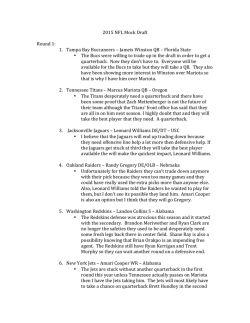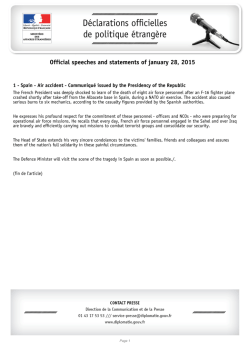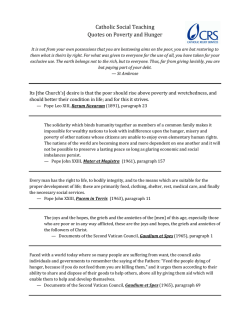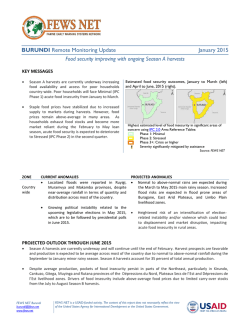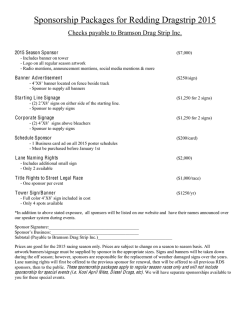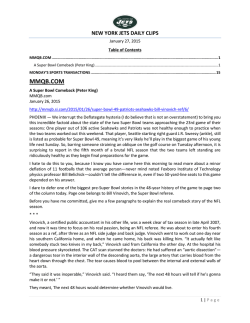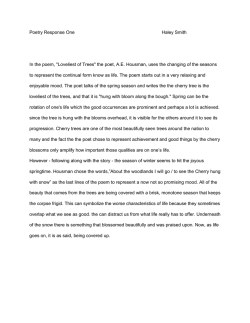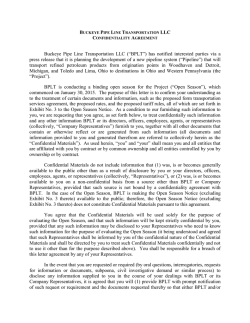
January 28, 2015 Kevin Williamson with an interesting
January 28, 2015 Kevin Williamson with an interesting take on the annual Davos gathering. Convening to ring the alarm about global warming, our putative betters and would-be rulers gathered in Davos, Switzerland, filling the local general-aviation hangars with some 1,700 private jets. Taking an international commercial flight is one of the most carbon-intensive things the typical person does in his life, but if you’re comparing carbon footprints between your average traveler squeezed into coach on American and Davos Man quaffing Pol Roger in his cashmere-carpeted intercontinental air limousine, you’re talking Smurfette vs. Sasquatch. The Bombardier’s Global 6000 may be a technical marvel, but it still runs on antique plankton juice. The emissions from heating all those sprawling hotel suites in the Alps in winter surely makes baby polar bears weep bitter and copious baby-polar-bear tears. The stories add up: Jeff Greene brings multiple nannies on his private jet to Davos, and the rest of the guys gathered to talk past each other about the plight of the working man scarf down couture hot-dogs that cost forty bucks. Bill Clinton makes the case for wealth-redistribution while sporting a $60,000 platinum Rolex. ... ... These ridiculous hypocrites deserve every syllable of abuse that comes their way. I instinctively write off all denunciations of the wicked 1 percent coming from anybody unwilling to live at or below the median U.S. household income, which amounts to less than Clinton’s Rolex is worth. But there is something worse at work here than hypocrisy: stupidity. And stupidity is, like private-jet travel, shockingly expensive. Our governments and our business and political elites are not mainly made up of stupid people. One of the shocking things about getting to know people in government, whether in elected office or in the bureaucracies, is that they are mostly bright, well-intentioned, and honest. Together they represent a sterling example of one of the most important and least understood of modern social paradoxes: None of us is as dumb as all of us. ... Davos hypocrisy gets a post from Jonathan Tobin. Glenn Reynolds, of Instapundit fame, is fond of saying that he’ll believe there’s a climate change crisis when the people who say there’s a climate change crisis start acting like there’s a climate change crisis. They haven’t started yet. The annual World Economic Forum at Davos, Switzerland, for instance, is on right now and its attendees arrived in an estimated 1,700 private jets. Among the attendees are Al Gore and Pharrell Williams. ... Daniel Hannan posts on Davos too. This will be the last time anti-globalisers protest at the World Economic Forum in Davos. From 2016, the ministers, chief executives, columnists and assorted quangocrats who gather at the Swiss resort won’t see so much as a stray dreadlock: eco-protesters say the meeting is no longer worth picketing. You can see why they might feel conflicted. Davos is a place where powerful people pick up consultancies and directorships and international posts. Left-wingers rightly resent this. What they see, in Marxist terms, is a gang of rentiers coming together to devise new means to live off the sweat of the workers. Against a background of dazzling, empty slopes – there are no skiers, because every chalet has been hired by an NGO or a multi-national – the few hatch schemes against the many. Yet, when it comes to free markets, Davos Man is often on the same side as the Lefties. He derives most of his income, directly or indirectly, from state patronage. If he is in the private sector – and he is more likely to be a lobbyist, politician or bureaucrat than a businessman – he’ll be an instinctive monopolist, keen to persuade ministers and officials to raise barriers against his potential rivals. ... Speaking of people who are full of themselves, ESPN has a story on the flameout of Johnny Manziel. The name on the card that night in May seemed to draw as much anxiety as it did excitement; Johnny Manziel, Quarterback, Texas A&M. The former Heisman Trophy winner had been passed over 21 times, prompting a text from Manziel to then-Browns quarterbacks coach Dowell Loggains that he wanted to "wreck this league" in Cleveland. The words were actually more R-rated, but the implication was clear. Twitter erupted at the selection. A Cleveland radio host cheered and screamed openly on air. Manziel gave his "money" sign as he walked onstage to greet Roger Goodell. By season's end, cheering had turned to frustration and anger as Manziel struggled mightily in almost six quarters as a starter, then was fined for being AWOL the final Saturday of the season. Offensive coordinator Kyle Shanahan resigned with two years left on his contract. Loggains was fired. The Browns openly discussed Manziel's viability as the franchise's quarterback at a wideranging postseason staff meeting about the roster. And at least a couple of Manziel's teammates were joking his text should have read "wreck this team." Now the Browns point to 2015 with a talented but misguided quarterback who must repair the wreckage done in his own locker room. ... ... Opinions on Manziel are so varied -- one league insider says "think Steve Young," while ESPN analyst Merril Hoge says think "sixth-round talent" -- that making judgments on his long-term value is still difficult. Manziel still has support in the building, particularly on the business side because of the attention he commands in stadiums and merchandise lanes. Though the team said football decisions were made without influence or pressure, some coaches and many players had the clear perception the business and marketing end of the team favored the guy whose jerseys would sell. Manziel led the NFL in jersey sales in July, before taking a training camp snap. His off-field star power is uncommon for most rookies: His super-friends include Drake and LeBron and Bieber. "What Johnny has to understand is [if] he has another year like he just had, he's not going to be famous anymore," one NFL team exec said. "LeBron James is going to lose his number." Because Drudge has a sense of humor they linked to a one year old NY Times piece suggesting the possibility of the end of snow. We have a little bit of a long piece. Follow the link if you want more. If we read to much of the Times, you will loose IQ points. OVER the next two weeks, hundreds of millions of people will watch Americans like Ted Ligety and Mikaela Shiffrin ski for gold on the downhill alpine course. Television crews will pan across epic vistas of the rugged Caucasus Mountains, draped with brilliant white ski slopes. What viewers might not see is the 16 million cubic feet of snow that was stored under insulated blankets last year to make sure those slopes remained white, or the hundreds of snow-making guns that have been running around the clock to keep them that way. Officials canceled two Olympic test events last February in Sochi after several days of temperatures above 60 degrees Fahrenheit and a lack of snowfall had left ski trails bare and brown in spots. That situation led the climatologist Daniel Scott, a professor of global change and tourism at the University of Waterloo in Ontario, to analyze potential venues for future Winter Games. His thought was that with a rise in the average global temperature of more than 7 degrees Fahrenheit possible by 2100, there might not be that many snowy regions left in which to hold the Games. He concluded that of the 19 cities that have hosted the Winter Olympics, as few as 10 might be cold enough midcentury to host them again. By 2100, that number shrinks to 6. ... The pope is at it again. He wants people to put down their iPhones and start talking. Is there any cliche the man can resist? Telegraph, UK has the story. Pope Francis is urging families to put aside their iPhones and Twitter feeds and learn to talk to one another again. In his annual message for the church's World Day of Communications, released Friday, the Pope said media can both help or hinder family communication – helping far-flung members stay in touch but also enabling others to avoid one another. "The great challenge facing us today is to learn once again how to talk to one another, not simply how to generate and consume information," the Pope said. ... National Review Davos’s Destructive Elites “None of us is as dumb as all of us.” by Kevin D. Williamson Convening to ring the alarm about global warming, our putative betters and would-be rulers gathered in Davos, Switzerland, filling the local general-aviation hangars with some 1,700 private jets. Taking an international commercial flight is one of the most carbon-intensive things the typical person does in his life, but if you’re comparing carbon footprints between your average traveler squeezed into coach on American and Davos Man quaffing Pol Roger in his cashmere-carpeted intercontinental air limousine, you’re talking Smurfette vs. Sasquatch. The Bombardier’s Global 6000 may be a technical marvel, but it still runs on antique plankton juice. The emissions from heating all those sprawling hotel suites in the Alps in winter surely makes baby polar bears weep bitter and copious baby-polar-bear tears. The stories add up: Jeff Greene brings multiple nannies on his private jet to Davos, and the rest of the guys gathered to talk past each other about the plight of the working man scarf down couture hot-dogs that cost forty bucks. Bill Clinton makes the case for wealth-redistribution while sporting a $60,000 platinum Rolex. The hypocrisy of our literally (literally, Mr. Vice President!) high-flying crusaders against fossil fuels — who overlap considerably with our high-living crusaders against economic inequality — is endlessly annoying if frequently entertaining. And there is something unseemly about enduring puritanical little homilies on how we need to learn to live with less from guys wearing shoes that cost more than the typical American family earns in a quarter. When that obnoxious Alec Baldwin character from Glengarry Glen Ross informs that sad-sack real-estate salesman that his watch costs more than that guy’s car, he was trying to provoke him into getting richer, to the tune of a Cadillac Eldorado or, if not that, at least the second-prize set of steak knives. But our modern progressive versions of that guy are even more obnoxious: They demand that we lower our expectations while they live lives of opulence that would have embarrassed the Count of Monte Cristo. Out-obnoxious-ing a guy with Alec Baldwin’s smirking mug takes a lot of brass. These ridiculous hypocrites deserve every syllable of abuse that comes their way. I instinctively write off all denunciations of the wicked 1 percent coming from anybody unwilling to live at or below the median U.S. household income, which amounts to less than Clinton’s Rolex is worth. But there is something worse at work here than hypocrisy: stupidity. And stupidity is, like private-jet travel, shockingly expensive. Our governments and our business and political elites are not mainly made up of stupid people. One of the shocking things about getting to know people in government, whether in elected office or in the bureaucracies, is that they are mostly bright, well-intentioned, and honest. Together they represent a sterling example of one of the most important and least understood of modern social paradoxes: None of us is as dumb as all of us. There exists in every human being, in every human organization, and every human system a sort of epistemic horizon, a real and meaningful boundary on the amount of knowledge and cognitive firepower that that person or agency can bring to any given problem. This is a fact that is at some level known and understood across the political spectrum: It is the cornerstone of the progressives’ case for diversity, in that people with different knowledge inventories, different experiences, and different perspectives are more likely to discover effective solutions to complex problems than are groups that are more intellectually homogeneous. For conservatives of a Hayekian bent, this is the familiar “knowledge problem,” the understanding that markets will allocate resources more productively than political agencies will because markets are the only effective means of aggregating usable information about specific economic situations. We understand the problem of the epistemic horizon, but we do not apply that understanding nearly broadly enough. Progressives believe that “diversity” increases when an organization dominated by white men who are overwhelmingly graduates of the same five law schools, who have read the same books, watch the same television shows, and hold the same relatively narrow range of political opinions adds to its personnel a white woman or a black man who is also a graduate of one of those same five law schools, who has read the same books, watches the same television shows, and holds political views within that same relatively narrow range. Conservatives, to their credit, generally understand that intellectual homogeneity is different from ethnic or sexual homogeneity, but they, too, are generally too unwilling to carry through the more radical implications of that knowledge. The intellectual homogeneity of policymaking elites is a serious and underestimated problem. To take an obvious example: The American policymaking class includes both progressives and conservatives, but it is overwhelmingly dominated by college graduates and people in occupations that are largely open only to college graduates. Unsurprisingly, our educational-policy debate is almost exclusively focused on how to get more people prepared for college, how to get more people through college, and how to help college graduates deal with financial obligations incurred in the course of a college education. Even a celebrity like John Ratzenberger (Cliff Clavin of Cheers), whose background is in carpentry and whose interest is in cultivating skilled labor, has a difficult time influencing that debate. This is not a result of ill will, selfishness, or malfeasance on the part of elites; it is just that it seems natural to them that the sorts of problems people like them tend to have are the ones that we need to focus on, and that what worked in their lives will work for everybody else. The people who gather at Davos are wildly successful. And while some of them are simply selfserving and self-aggrandizing twits, the great majority of them genuinely want to help others lead happier, richer, more secure lives. Whatever Bill Gates is about, it’s a safe bet that he’s not in it for the money at this point. But billionaire entrepreneurs in sufficient number become as intellectually homogeneous a group as any university women’s-studies department. People whose profession is the crafting of legislation or the application of regulation reflexively (and understandably) assume that if you want more of something, then the thing to do is to pass a law mandating it, and that if you want less of something, then the thing to do is to pass a law punishing it. The bigger picture — that laws and regulations and other aspects of policy interact with one another in unexpected ways — is generally invisible to them. If you are a lawyer, then you understand most social questions as a matter of law; if you are an economist, you understand them as questions of economics; if you are a teacher, you think that the answer to many social problems is better schools. This habit is only natural. Conservatives are generally inclined to make a moral case for limited government: that transfers are corrupting, that taxes should be collected only to the extent that they are essential, that regulation is a necessary evil and that as such it should be kept to a minimum. That is generally true and persuasive, but the more important argument is the problem of ignorance. Even if Congress were populated exclusively by saintly super-geniuses, there is only so much that 535 human beings can know and understand. The more that decision-making is centralized in political agencies, or even in elites outside of formal government, the more intensively those decisions will be distorted by ignorance. This is true of market-oriented institutions, too, in the sense that big businesses make big mistakes. One of the lessons of the 2007 financial crisis is that the guys who run the banks do not actually know that much about how banks work, even if they know 100 times what the banking regulators know. Free markets offer a critical, if imperfect and partial, corrective to that in the form of financial losses and business failures, which is why things like cars and computers consistently improve while schools and welfare programs don’t. Big markets with lots of competing buyers and sellers are the biggest thinking machines we have, offering the broadest epistemic horizon that our species has figured out how to achieve. There is a deep philosophical challenge for progressives in that: Progressives say that they want inclusive social decision-making, but the most radically inclusive process we have for social decision-making is the thing that they generally distrust and often hate: capitalism — or, as our leftleaning friends so often put it, “unfettered” capitalism. And who should decide what sort of fetters are applied to whom? The view from Davos is, unsurprisingly: the people at Davos. The hypocrisy and material self-indulgence on display at Davos may rankle, but the deeper problem is the unspoken assumption that the sort of people who gather in Davos are the sort of people who have the answers to social problems. Historically speaking, there is little evidence to support that proposition. And that is why conventions like that in Davos end up being so frequently counterproductive. When elites get together to talk about the big issues, the discussion consists mostly of very similar people asking themselves what people like them can do. The answer is: A whole lot less than you think. Contentions Flying Around on Private Jets to Save the Planet by John Steele Gordon Glenn Reynolds, of Instapundit fame, is fond of saying that he’ll believe there’s a climate change crisis when the people who say there’s a climate change crisis start acting like there’s a climate change crisis. They haven’t started yet. The annual World Economic Forum at Davos, Switzerland, for instance, is on right now and its attendees arrived in an estimated 1,700 private jets. Among the attendees are Al Gore and Pharrell Williams. They are in Davos to announce that there will be a repeat of 2007’s Live Earth concert, which was held in venues around the world that year to unite people in saving the planet. The new concert has the objective of getting a petition signed by one billion people: Williams, who performed at Live Earth Rio in 2007 but wouldn’t comment on whether he’d take the stage this time around, stressed that the festival’s lineup isn’t as important as its purpose. “Instead of just having people perform, we literally are going to have humanity harmonize all at once,” Pharrell said. The goal of the 24-hour festival is to collect one billion signatures urging world leaders to adopt a new climate accord at the Paris conference. The Paris conference will be the latest meeting of the IPCC, the U.N.’s Intergovernmental Panel on Climate Change. These IPCC conferences are always held in places anyone would like to travel to on someone else’s nickel. The one held in Bali a few years ago was so crowded with private jets that people had to be ferried over from an airport on next-door Java. I trust that Charles DeGaulle Airport has plenty of parking space for private jets. And speaking of private jets, take a look at Pharrell Williams’ personal carbon footprint. (H/T PowerLine). Is there any limit to the sacrifice he’s willing for other people to make to save the planet? Cap X Davos is a corporatist racket by Daniel Hannan This will be the last time anti-globalisers protest at the World Economic Forum in Davos. From 2016, the ministers, chief executives, columnists and assorted quangocrats who gather at the Swiss resort won’t see so much as a stray dreadlock: eco-protesters say the meeting is no longer worth picketing. You can see why they might feel conflicted. Davos is a place where powerful people pick up consultancies and directorships and international posts. Left-wingers rightly resent this. What they see, in Marxist terms, is a gang of rentiers coming together to devise new means to live off the sweat of the workers. Against a background of dazzling, empty slopes – there are no skiers, because every chalet has been hired by an NGO or a multi-national – the few hatch schemes against the many. Yet, when it comes to free markets, Davos Man is often on the same side as the Lefties. He derives most of his income, directly or indirectly, from state patronage. If he is in the private sector – and he is more likely to be a lobbyist, politician or bureaucrat than a businessman – he’ll be an instinctive monopolist, keen to persuade ministers and officials to raise barriers against his potential rivals. (I say “he”, though his female equivalent can also be found stalking the conference rooms in her sharp trouser suit.) Some Lefties, in short, may finally be grasping the difference between being anti-business and being anti-market. Others refuse to see any distinction, insisting, with a kind of mulish narcissism, that if A and B both separately disagree with them, then A and B are, to all intents and purposes, indistinguishable. For the record, most Right-wingers heartily dislike the Davos racket. The only reason we don’t demonstrate in the slush alongside the Occupy crowd is that most of us have jobs. We know in our bones that Davos Man despises us and our values. As Samuel Huntingdon once put it, the delegates “view national boundaries as obstacles that thankfully are vanishing, and see national governments as residues from the past whose only useful function is to facilitate the élite’s global operations.” All right, you say, but surely it’s useful for powerful people to exchange ideas and learn from each other’s mistakes. Well, yes; but this lot rarely seem to learn. Whatever the problem, their preferred solution is always to establish a global bureaucracy staffed by people like themselves. Obviously, they don’t put it like that. “The stability of the global economy” is a much prettier phrase than “a juicy public sector post for me”. It’s like an Ayn Rand novel, where lobbyists reach cosy arrangements with each other in elliptical language. Remember the way she described members of a company board? “Men whose careers depended on keeping their faces bland, their remarks inconclusive and their clothes immaculate”. That’s Davos. If only these men really were as clever as they thought. Or, to be more precise, if only their cleverness translated into making good decisions. In fact, Davos Man consistently gets the big calls wrong. In the 1970s, he was for prices and incomes policies. In the 1980s, he was for the ERM. In the 1990s, he was for the euro. In the 2000s, he was for the bank bailouts. A whole academic discipline has grown up to explore why bright, educated people make these errors of judgment. One theory is that, being bright, they over-value their hunches. Put a large group of such people together, so that their hunches become self-reinforcing, and you get the disastrous groupthink to which experts are prone. The World Economic Forum would thus be a dodgy enough event even if all its members were disinterestedly seeking to advance human happiness. But, of course, most of them are doing no such thing. Surrounded by power and patronage, delegates naturally line one another up for jobs – jobs paid for, more often than not, by taxpayers. A mild aversion to cliché has, until now, held me back from quoting Adam Smith’s most famous aphorism. But, in the context of the World Economic Forum, nothing else will do: “People of the same trade seldom meet together, even for merriment and diversion, but the conversation ends in a conspiracy against the public, or in some contrivance to raise prices.” Yup. And free-marketeers want no part in it. Daniel Hannan is a Conservative Member of the European Parliament and blogs at www.hannan.co.uk. His other CapX articles can be found here. ESPN Inside Manziel's rocky rookie season Browns sources reveal that celebrity quarterback was a turbulent presence in '14 by BEREA, Ohio -- The name on the card that night in May seemed to draw as much anxiety as it did excitement. Johnny Manziel, Quarterback, Texas A&M. The former Heisman Trophy winner had been passed over 21 times, prompting a text from Manziel to then-Browns quarterbacks coach Dowell Loggains that he wanted to "wreck this league" in Cleveland. The words were actually more R-rated, but the implication was clear. Twitter erupted at the selection. A Cleveland radio host cheered and screamed openly on air. Manziel gave his "money" sign as he walked onstage to greet Roger Goodell. By season's end, cheering had turned to frustration and anger as Manziel struggled mightily in almost six quarters as a starter, then was fined for being AWOL the final Saturday of the season. Offensive coordinator Kyle Shanahan resigned with two years left on his contract. Loggains was fired. The Browns openly discussed Manziel's viability as the franchise's quarterback at a wideranging postseason staff meeting about the roster. And at least a couple of Manziel's teammates were joking his text should have read "wreck this team." Now the Browns point to 2015 with a talented but misguided quarterback who must repair the wreckage done in his own locker room. Interviews by ESPN.com with nearly 20 Browns sources, both on the record and on condition of anonymity, along with several NFL personnel sources reveal the Manziel-related problems run deep. Those who spoke talked of a yearlong pattern that showed a lack of commitment and preparation, a failure to be ready when given a chance in his first start against Cincinnati and a continued commitment to nightlife, which affected his preparation and work while in the team facility. From the moment the Browns drafted him, the brash Manziel was never short on confidence. As one player put it, Manziel throughout the entire 2014 season was a "100 percent joke." Some said it should not have been a surprise, that the Browns were well aware what they were getting. "During the draft process, not one person interviewed by the team said he was going to grow up," said one source directly involved in the drafting of Manziel. "You can't blame Johnny. This is who he is. The team knew that." ESPN.com requested to interview coach Mike Pettine or general manager Ray Farmer about Manziel, and made several attempts to reach Manziel through intermediaries. The Browns and a Manziel rep from LRMR Management referred specific questions about the quarterback to the interviews all parties gave after the season. "I need to start doing every single thing and everything the right way and if I don't I'm going to be exposed," Manziel said shortly after the season. The theme from Pettine and Farmer in postseason news conferences was blunt: It's time for Manziel's actions to back up his words. Farmer did not mention anything from 2014 when asked what made him believe Manziel can succeed. His belief, he said, is based on "everything he did in three years when he was in college." People close to Manziel say he's a well-intentioned 22-year-old who wants to be great but needed an NFL season to realize natural ability isn't enough. Some teammates doubt he can ever change. Others are hopeful. "People make mistakes," cornerback Joe Haden said. "I'm all about giving second chances." Words and actions The sequence reeked of contradiction during the last week of the season. MANZIEL BY THE NUMBERS 2014 game-by-game passing statistics: Opp Comp Att Yds TD INT N.O. 0 1 0 0 0 Buf. 5 8 63 0* 0 Cin. 10 18 80 0 2 Car. 3 8 32 0 0 * scored rushing touchdown at Buffalo On that Tuesday, Manziel stood in front of about 20 media members and outlined his plan to become the Browns' answer at quarterback. He wanted to be "the guy" for Cleveland, he said, and would do so by taking his job more seriously. He was more animated than he'd been all year, eager to declare his intentions. Four days later, stories in the Browns' facility began to circulate. Manziel was not present the morning before the season finale. Team security drove to Manziel's downtown home to check on him. The Browns were packing up for the season finale at Baltimore on Dec. 28. Two team sources said security found a player who they felt clearly had partied hard the night before. One source used the words "drunk off his a--." The official word was that Manziel was "late," but players said they didn't see Manziel until the Browns' chartered airplane prepared to take off in the afternoon, that he was not present all morning. The team fined Manziel for missing treatment on his injured hamstring, then had him sit in the locker room during the season finale in Baltimore. "Johnny's his own worst enemy," one source said. Monday after the season, Manziel had another news conference, saying many of the same things from six days earlier -- actions must support words. That night he was featured in Instagram photos on Miami Beach, a few days later at a club in Houston and a few days after that on a mountain in Aspen, Colorado. "I brought this on myself," Manziel said the day after the Baltimore game. "I brought these cameras and all these people that are in this locker room right now and I don't think it's fair to myself, I don't think it's fair to anybody in this locker room the distractions I've brought at points in time." None of his teammates talked about disliking Manziel personally. In fact, a "good guy" theme is prevalent with him. Some players vouch for his work ethic. Left guard Joel Bitonio said "you can tell" Manziel wants to be good and "works his tail off" in the weight room. But several Browns sources say privately Manziel's words to the media -- he's not the same Johnny Football, he's learned how to be a pro -- simply didn't always match his work. "He's competitive," said tight end Jordan Cameron, a free agent. "So I'm hoping that competitive nature will get him past all the other stuff. Hopefully he does, and hopefully he figures it out." In his first career start, Manziel posted a 1.0 QBR during an embarrassing 30-0 loss to the Bengals. Results matched preparation The Browns have an honor system with fining players for tardiness to team activities -- $250 for first offense, $500 for second, etc. The money can go to charity. It's uncertain how much coaches collected from Manziel, but one source said Manziel was late often enough that it was never a surprise when he was. One Browns staffer said he believed Manziel didn't get tough love when attention to detail wasn't there, that the team did not always hold him accountable when he was late. "He's a kid that I think wants to do well but needs to be shown how, and he didn't always get that help, in my opinion," one Browns staffer said. Manziel's on-field results were, at best, mixed. In his first game, in Buffalo in relief of a struggling Brian Hoyer, he led a touchdown drive on his first possession. But readiness became an issue once Manziel got the starting job the following week. Several sources said Manziel either didn't know the plays in the huddle or didn't call them correctly. The Browns tried to get him comfortable by using shotgun and pistol formations on about 80 percent of his downs and by simplifying the offense. But more than once, teammates corrected the play call in the huddle, or headed to the line hoping things would work because the call was wrong. Sometimes, the offense would get lined up wrong because Manziel forgot to read the whole play or got the verbiage wrong (saying "left" instead of "right," for example). Manziel's stat line from his first start: 10-of-18 passing for 80 yards, two interceptions and a 1.0 QBR. It's not easy for rookies to learn plays, and some struggle. Shanahan's system was by no means simple. Some Browns coaches felt Manziel would have transitioned better with a redshirt season. When asked recently about rookies transitioning to the NFL, Titans coach Ken Whisenhunt said taking snaps under center and learning new terminology takes time for many rookies, though he noted his former quarterback in Pittsburgh, Ben Roethlisberger, adjusted quickly. Players said the problems they saw in the huddle and on the field against the Bengals were similar to what they saw in practice. Several sources said Manziel did not practice well leading up to his first start, completing fewer than 50 percent of his passes during the week. Also that week's practices were not full-speed as Pettine tried to rest veterans, which further compounded uncertainty. Manziel's preparation was marginally better for his second start, at Carolina, although the numbers didn't reflect much of an improvement with a 4.8 QBR. Some veterans "clearly didn't want to play for [Manziel]" because of the lack of readiness, and they responded better to undrafted rookie Connor Shaw in part because he knew the plays, sources said. It wasn't lost on players that Shaw played through a dislocated finger on his left hand and a rib injury that had him passing blood after the season finale, while Manziel played six quarters before hurting his hamstring, then missed treatment on the injury on the final Saturday because he was still in bed. One source stressed Manziel worked much harder in his two weeks as a starter than in the previous three months, but it was more like cramming for a test and he could not make up for his lack of work before the starts. Farmer said Manziel thought he was ready, but once he encountered the speed of the game he realized in a hurry he wasn't. "He had a positive notion going in, but then it was turned around on him," Farmer said. Did Farmer believe he was ready? "Sure," Farmer said. Pettine said he played Manziel hoping for a spark, that Hoyer was struggling to the point he felt he had to make the move. "We knew that Johnny, for us, was the big unknown," Pettine said the day after the season ended. "It obviously didn't work out." Shouldn't have been a surprise The biggest on-field concern with Manziel as he moved into the NFL was whether he could master the nuances of a pro system. At Texas A&M, the emphasis was on tempo, calling plays in a hurry and getting to the line to run plays quickly. In the NFL, pre-snap reads, protections and coverages matter more than tempo. At A&M, the center made protection calls and Manziel's job was, in part, to find mismatches, often throwing to dominant 6-foot-5 receiver Mike Evans or scrambling when plays broke down. "The way we talked about him in meetings, the kid never put in the time he needed to -- studying film, organizing workouts, 7-on-7 workouts -- he didn't do it," said one NFC scout with a Southeastern Conference focus. "His thing would be he's going to show up on Saturdays, 'I'm a gamer.' He'd show up for practices and games but that's about it. Johnny thought he was an NFL superstar before he came [into the league]." One A&M source said Manziel's attitude is catching up to him. Manziel was lax in preparation unless the Aggies were playing a top-tier opponent, such as Alabama or Auburn, when "you couldn't get him out of the film room," the source said. Against Rice or Sam Houston State, not so much. Neither owner Jimmy Haslam nor new offensive coordinator John DeFilippo has committed to starting Manziel in 2015, and with Brian Hoyer an impending free agent, the future of the Browns' quarterback position is in doubt. Farmer will not reveal where any player is ranked on the team's draft board. Sources, though, said Shanahan liked Jimmy Garoppolo, now with New England, or Tom Savage, now with Houston. Debate existed among assistant coaches about Manziel's draft ratings, with some not giving him a first-round grade. One personnel exec said Manziel is a "talented, unconventional quarterback" whose skill set is wasted when used in traditional NFL sets. Another exec likened him to a young Brett Favre -- he'll go out and have fun and is confident enough in his ability to offset the nightlife. In one particular draft room, the exec recalls a discussion that Manziel might be a "model citizen" in Year 1 but could revert to partying in Year 2. "It takes focus and commitment [to succeed in NFL], which he clearly didn't have," the exec said. Can Manziel become a franchise cornerstone? John DeFilippo, who succeeded Shanahan as the Browns' offensive coordinator, did not commit to Manziel during his introductory conference call on Thursday. "We're not sure if our starting quarterback is in the building or not," DeFilippo said. "If he is, great. If he isn't, great too." Later that evening, owner Jimmy Haslam echoed those remarks while speaking to reporters at an awards banquet. "We've got to get a quarterback and got to get it fixed," he said. The Browns stand behind their statement that "actions speak louder than words." "To me, there should be no sense of entitlement [that] because he was drafted where he was drafted, therefore he is the starter," Pettine said shortly after the season. "We're not going to connect those dots." The Browns held wide-ranging staff meetings in early January, and coaches and personnel staffers openly discussed Manziel. The meetings did not produce a strong push to cancel the Johnny Football project. "I think there's an opportunity for the guy to make changes," Farmer told media in late December, believing Manziel can be a "solid starter" in this league. "It's up to him if he's going to make those changes." One former NFL assistant coach familiar with developing quarterbacks said it was a mistake to draft Manziel, but it would be a bigger mistake to let him go. Manziel emphatically embraces his celebrity while hanging out with A-list celebrities such as LeBron James. Others, though, maintain the problems balloon when a team sticks with an uncommitted player. At least one candidate to replace Shanahan believed Manziel was not the answer, according to a source. Opinions on Manziel are so varied -- one league insider says "think Steve Young," while ESPN analyst Merril Hoge says think "sixth-round talent" -- that making judgments on his long-term value is still difficult. Manziel still has support in the building, particularly on the business side because of the attention he commands in stadiums and merchandise lanes. Though the team said football decisions were made without influence or pressure, some coaches and many players had the clear perception the business and marketing end of the team favored the guy whose jerseys would sell. Manziel led the NFL in jersey sales in July, before taking a training camp snap. His off-field star power is uncommon for most rookies: His super-friends include Drake and LeBron and Bieber. "What Johnny has to understand is [if] he has another year like he just had, he's not going to be famous anymore," one NFL team exec said. "LeBron James is going to lose his number." NY Times The End of Snow? by Porter Fox 2/7/14 OVER the next two weeks, hundreds of millions of people will watch Americans like Ted Ligety and Mikaela Shiffrin ski for gold on the downhill alpine course. Television crews will pan across epic vistas of the rugged Caucasus Mountains, draped with brilliant white ski slopes. What viewers might not see is the 16 million cubic feet of snow that was stored under insulated blankets last year to make sure those slopes remained white, or the hundreds of snow-making guns that have been running around the clock to keep them that way. Slopes were closed last month at Fichtelberg mountain in Oberwiesenthal, Germany. Officials canceled two Olympic test events last February in Sochi after several days of temperatures above 60 degrees Fahrenheit and a lack of snowfall had left ski trails bare and brown in spots. That situation led the climatologist Daniel Scott, a professor of global change and tourism at the University of Waterloo in Ontario, to analyze potential venues for future Winter Games. His thought was that with a rise in the average global temperature of more than 7 degrees Fahrenheit possible by 2100, there might not be that many snowy regions left in which to hold the Games. He concluded that of the 19 cities that have hosted the Winter Olympics, as few as 10 might be cold enough midcentury to host them again. By 2100, that number shrinks to 6. ... Telegraph, UK Pope Francis: put your iPhone down and start talking Pope Francis says families should put aside their iPhones and Twitter feeds and talk to each other Pope Francis is urging families to put aside their iPhones and Twitter feeds and learn to talk to one another again. In his annual message for the church's World Day of Communications, released Friday, the Pope said media can both help or hinder family communication – helping far-flung members stay in touch but also enabling others to avoid one another. "The great challenge facing us today is to learn once again how to talk to one another, not simply how to generate and consume information," the Pope said. The theme of this year's message coincides with the Pope's two-year focus on families, which will culminate in October with a big meeting of bishops to hash out better ways to minister to families living with divorce, de-facto unions, gay children and other issues. The Pope said children first learn to communicate in the family, figuring out how to get along with people of different ages and experience. As a result, he said, families are the model for all communications since it is in the family where children first learn to forgive. "A perfect family does not exist," he said. "We should not be fearful of imperfections, weaknesses or even conflict, but rather learn how to deal with them constructively." The Pope referred to families on Friday in a separate speech to the Roman Rota, the Vatican tribunal which handles annulment cases. He called for church tribunals around the globe to offer annulment services for free, saying all Catholics have the right to justice from the church. "Sacraments are free," he said. The Pope also said tribunal judges should take into account that ignorance of the faith can be a reason to declare a marriage invalid. The Pope has previously quoted his predecessor as Buenos Aires archbishop as saying half of the marriages that are celebrated are essentially invalid because people enter into them not realising that matrimony is a lifelong commitment.
© Copyright 2026

